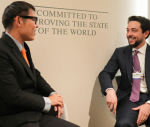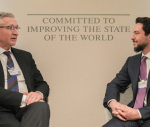You are here
Former FM says perceived absence of social justice fuels young people’s radical leanings
By Dana Al Emam - Sep 25,2014 - Last updated at Sep 25,2014
AMMAN — The lack of an education system that promotes critical thinking and respecting other opinions has created a “depressed” generation that does not feel social equality and so develops positive views of groups like the Islamic State, according to a former foreign minister.
“Some young people develop a desire to support radical groups thinking that such an act will boost their dignity,” former deputy prime minister Marwan Muasher said in a lecture on Wednesday evening, discussing Jordan’s needs to successfully achieve democracy, and ensure pluralism and social equality.
He said Jordan has given economic reform priority over political reform during the past 20 years, a step that proved its failure as it led to more corruption.
“There will be neither justice nor job opportunities if laws are not enforced equally on all citizens,” Muasher said, adding that the challenges facing Jordan as it moves towards the future requires a number of measures that deepen citizens’ collective work across the political spectrum.
“One of the major issues facing the reform drive in Jordan is that reformatory ideas are not deeply rooted on a wider popular basis,” he said.
Reform will not be real if it is exclusive to the political elite, without active public participation, added Muasher, who led the National Agenda steering committee, formed in 2005 to map out the country’s 10-year reform plan.
The veteran diplomat said people do not wish to hear promising slogans in the political arena; they “need to see reform programmes being implemented on the ground and making changes in their lives”.
The political arena in the Kingdom has been dominated by secular forces since its independence in 1946 and until the 1967 Arab-Israeli war.
But the failures in that period proved the incapability of these forces to keep their promises of democracy, Muasher said at the lecture, organised by the Free Thought Forum and the Friedrich Naumann Foundation.
After the war, the voice of Islamist political forces rose, announcing the famous slogan “Islam is the solution” but without accompanying it with on-the-ground plans, which caused the dominance of Islamist forces to dissolve as rebellions broke out in the region, he noted.
“The political situation nowadays is foggy, since none of the two political forces was able to resolve the issues of the Arab world,” he said, expecting any party with non-ideological, applicable programmes to dominate the upcoming political phase.
In order for political parties in Jordan to develop, they must receive adequate funding and find proper means of income, Muasher said.
“Otherwise, political parties will rely on the well-off elite for financial support, who may or may not be politically enlightened.”
Political parties with similar views need to create “a logical number of coalitions and alliances” to unite their ideas and gain a larger popular base, Muasher noted.
“In Tunisia’s last parliamentary elections, a total of 116 political parties ran for the polls; only eight of them got more than one seat in the parliament,” he said, adding that the mindset of individualism still dominates the region.
Related Articles
AMMAN — Countries in the region urgently need to embrace new social contracts that shape the relationship between peoples and governments, b
Future generations need to seize the opportunity the Arab Spring has offered to entrench respect of diversity and pluralism in their societies, former foreign minister Marwan Muasher said.
AMMAN — Six political parties which have recently formed a new political movement have mostly centrist ideologies that seek to achieve refor















